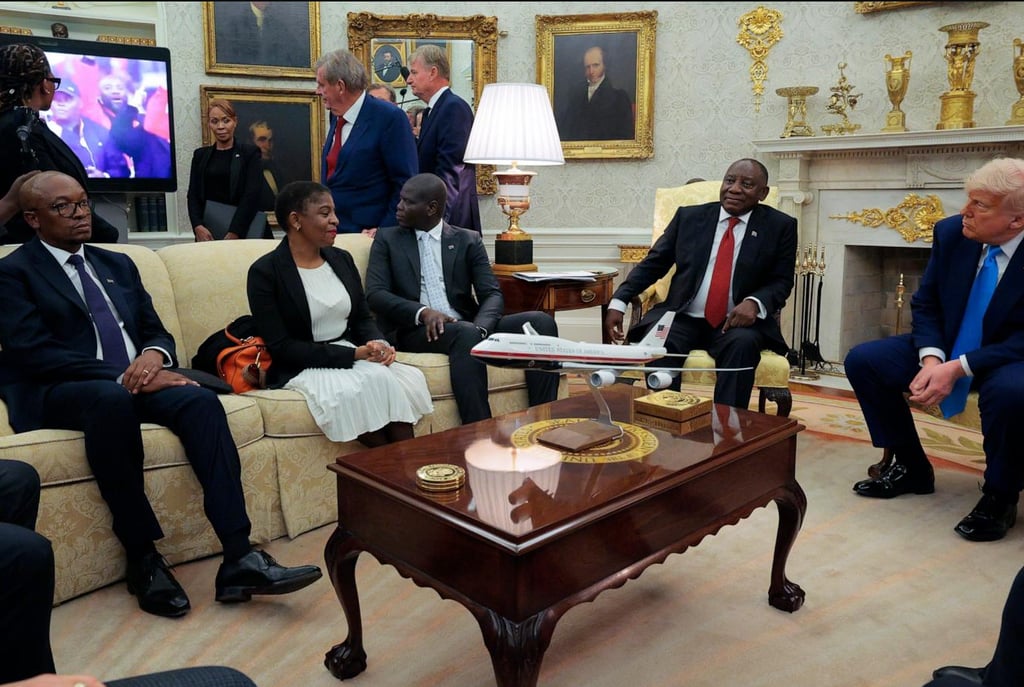Trump’s Graveyard of Lies: The South African Farmer Hoax and Its Global Fallout
5/22/20252 min read


Trump’s Graveyard of Lies: The South African Farmer Hoax and Its Global Fallout
In a startling turn of events, former U.S. President Donald Trump has once again found himself at the center of controversy, this time for peddling a fabricated narrative about a "genocide" of White South African farmers. On May 21, 2025, during a high-stakes meeting with South African President Cyril Ramaphosa, Trump presented what he claimed was evidence of 1,000 roadside graves of slain farmers. The twist? Those graves were nothing more than a staged protest, a fact that Trump either ignored or was unaware of, sparking outrage and raising serious questions about the integrity of international diplomacy.
The Scene: A Meeting Gone Awry
The setting was the Oval Office, a place where truths and lies have often clashed. Trump, known for his penchant for dramatic flourishes, decided to ambush Ramaphosa with a video purportedly showing the graves. The South African leader, maintaining his composure, later dismissed the claims as "completely false," a sentiment echoed by numerous fact-checkers and media outlets. The Washington Post and ABC News quickly debunked the story, revealing that the earthen mounds were part of a protest, not actual burial sites. This wasn't just a misstep; it was a deliberate misrepresentation that could have far-reaching consequences.
The Bigger Picture: A Pattern of Deception
This incident isn't isolated. Trump's history of spreading misinformation, especially on international stages, is well-documented. From claiming a "genocide" in South Africa to ignoring the country's complex history of violence under apartheid, his actions have consistently prioritized sensationalism over substance. The Atlantic's analysis of presidential lies suggests that such falsehoods, particularly those with policy implications, can be grounds for impeachment. In this case, the lie wasn't just domestic; it was diplomatic, potentially damaging U.S.-South African relations and undermining global trust.
The Fallout: International Relations and Domestic Politics
The repercussions of Trump's actions are multifaceted. Internationally, his claims could exacerbate racial tensions and misrepresent the situation in South Africa, a country still healing from its apartheid past. Domestically, it fuels a narrative that aligns with certain political agendas, ignoring the broader context of land reform and historical injustices. The event also highlights a troubling trend: the use of social media and unverified sources to shape policy and public opinion, a practice that can have disastrous effects on global stability.
Why It Matters
This isn't just about one lie; it's about the erosion of truth in politics. When leaders present false narratives as fact, especially in sensitive international contexts, it undermines the very foundation of diplomacy. It raises questions about accountability, the role of media in fact-checking, and the responsibility of global leaders to verify information before making sweeping statements. The South African farmer hoax is a stark reminder of how quickly misinformation can spread and the damage it can cause.
Thought-Provoking Questions
How can international leaders ensure the accuracy of information before making public statements that could impact global relations?
What role should fact-checking play in political discourse, especially in the age of social media?
How can countries like South Africa combat misinformation that distorts their national narrative and history?
What are the long-term implications of such lies on U.S. foreign policy and its standing in the international community?
In a world where truth is increasingly under siege, the South African farmer hoax serves as a cautionary tale. It's a call to action for vigilance, accountability, and a renewed commitment to factual integrity in politics. As we navigate these turbulent waters, the question remains: how much longer can we afford to ignore the graveyard of lies?
hello@boncopia.com
+13286036419
© 2025. All rights reserved.